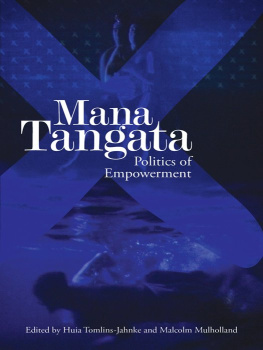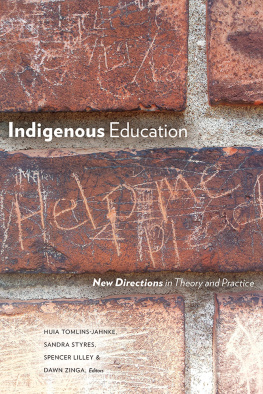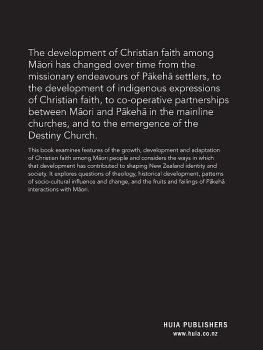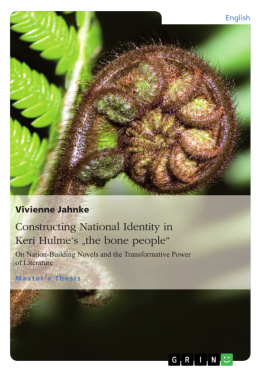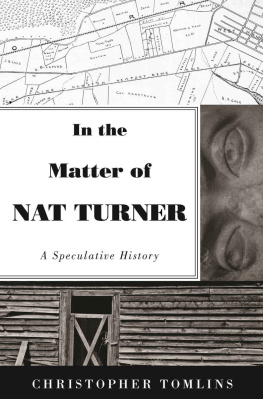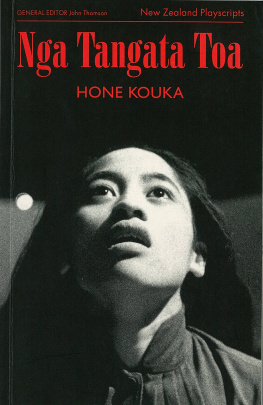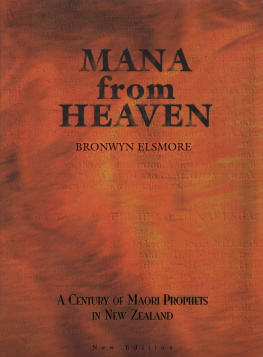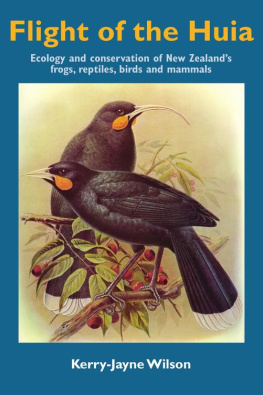Huia Tomlins-Jahnke - Mana Tangata
Here you can read online Huia Tomlins-Jahnke - Mana Tangata full text of the book (entire story) in english for free. Download pdf and epub, get meaning, cover and reviews about this ebook. publisher: Huia (NZ) Ltd, genre: Politics. Description of the work, (preface) as well as reviews are available. Best literature library LitArk.com created for fans of good reading and offers a wide selection of genres:
Romance novel
Science fiction
Adventure
Detective
Science
History
Home and family
Prose
Art
Politics
Computer
Non-fiction
Religion
Business
Children
Humor
Choose a favorite category and find really read worthwhile books. Enjoy immersion in the world of imagination, feel the emotions of the characters or learn something new for yourself, make an fascinating discovery.
- Book:Mana Tangata
- Author:
- Publisher:Huia (NZ) Ltd
- Genre:
- Rating:5 / 5
- Favourites:Add to favourites
- Your mark:
- 100
- 1
- 2
- 3
- 4
- 5
Mana Tangata: summary, description and annotation
We offer to read an annotation, description, summary or preface (depends on what the author of the book "Mana Tangata" wrote himself). If you haven't found the necessary information about the book — write in the comments, we will try to find it.
Mana Tangata — read online for free the complete book (whole text) full work
Below is the text of the book, divided by pages. System saving the place of the last page read, allows you to conveniently read the book "Mana Tangata" online for free, without having to search again every time where you left off. Put a bookmark, and you can go to the page where you finished reading at any time.
Font size:
Interval:
Bookmark:
First published in 2011 by Huia Publishers
39 Pipitea Street, PO Box 17335
Wellington, Aotearoa New Zealand
www.huia.co.nz
ISBN 978-1-86969-480-7
Copyright the authors 2011
Cover image: Rachael Rakena
This book is copyright. Apart from fair dealing for the purpose of private study, research, criticism or review, as permitted under the Copyright Act, no part may be reproduced
by any process without the prior permission of the publisher.
National Library of New Zealand Cataloguing-in-Publication Data
Mana tangata: politics of empowerment / edited by Huia Tomlins
Jahnke and Malcolm Mulholland.
Includes bibliographical references and index.
ISBN 978-1-86969-480-7
1. Maori (New Zealand people)Social conditions. 2. Maori (New
Zealand people)Economic conditions. 3. Maori (New Zealand
people)Civil rights. [1. Mana tangata. reo 2. Whakapakari -iwi. reo
3. huatanga ppori. reo 4. huatanga hanga. reo 5. Tino
rangatiratanga. reo] I. Tomlins-Jahnke, Huia. II. Mulholland, Malcolm, 1976-
305.899442dc 22
Ebook production 2012 by meBooks
Published with the assistance of Te Ptahi--Toi, School of Mori Studies, Massey University, and Manu Ao Academy

Sir Mason Durie
Tn koutou.
Mana Tangata is a collection of papers about Mori in modern times. Together, the contributions reflect the several dimensions that constitute the context within which Mori live. The significance of culture, the ongoing relevance of the Treaty of Waitangi, human health and the health of the natural environment are all addressed here by academics from Massey University. Their perspectives not only reflect their own experiences and research but draw on the conclusions reached by others and an appreciation of the significance of Mori heritage to life in the twenty-first century.
Importantly, the authors do not discount the impact of global, national and local forces, and in that respect have been able to convey a sense of dynamic change that has shaped and will continue to shape Mori aspirations. Within each paper there is a particular focus, but when read as a single volume, a holistic picture of Mori social, cultural, economic and environmental development emerges. Mori health, for example, cannot be considered without taking into account Mori participation in society, or environmental pollution, or the use of Mori language, or political ideologies. And the exercise of citizenship depends not only on individual rights and responsibilities but on the wider terms of access to justice and education, as well as the ways in which society aligns with Mori world views and values.
In the decades ahead Mori will form an increasingly larger proportion of the population; iwi will focus more on investments for the future rather than on grievances from the past; whnau will seek to be wealthier, healthier and more knowledgeable about the Mori world as well as the wider world; and children and grandchildren will be exposed to more complex and more diverse communities than their parents and grandparents knew.
Mana Tangata provides a sound platform for considering both the past and the future, and perhaps more importantly, for bringing the many components of the Mori world together.
Mason Durie
Assistant Vice-Chancellor (Mori)
Massey University
Huia Tomlins-Jahnke
Conversations about mana tangata are nearly always about human authority and upholding the dignity and wellbeing of a person or persons. The concept itself is deeply embedded in a dynamic system of kinship relationships and ancestral precedence that is mediated and guided by the value the community places on mana. Mana has to do with prestige, power and authority, and with both individual and collective wellbeing. Mori Marsden points out that included in the concept of mana are ideas inherent in words such as the Greek dunamai, from which are derived the words dynamic and dynamo. The derivative means to be capable or to have power, power in action and the power of the spoken word (Marsden 1997: 145). Interestingly, Marsden speaks about mana in terms of power to, power in or power of, and not power over, because customarily power was considered to be derived from higher forces ng atua or gods. People are never the source of power, but are agents through which the power of the gods may be expressed. Furthermore, the Mori view is that nature is not an object to be mastered by humankind, because in the Mori cosmos, humankind is the younger relation to flora and fauna. From this perspective it is possible to see how the notion of mana tangata focuses on the development of human potential. This includes providing opportunities for people to reach their full potential in efforts to ensure the health and wellbeing of their communities and of the generations to come.
Philosophies which underpin the concept of mana tangata are long standing and reinforced in customary traditions, socially founded values, ideals and norms. They are often manifest as legitimating charters against which, for example, it is possible to evaluate progress and assess the wellbeing of the collective and the contribution of an individual to society. Expertise, skills and knowledge are acknowledged as essential requisites for leading ones community; thus people with mana, besides those who have hereditary entitlements, tend to be in leadership roles. Proven works, skills and contributions made by an individual in the pursuit of collective aspirations provide human authority, or mana tangata.
This book is about Mori development and human authority associated with the collective whnau, hap and iwi and in the broadest sense highlights the social quality of mana tangata as requiring the recognition of achievement and of according respect where it is due (Mead 2003: 512). A basic premise of contemporary Mori endeavour in social, cultural or economic affairs is an expectation that state institutions and societal responses to aspirational ambition should enhance mana rather than diminish it. The negative impacts of colonisation exacted on the lives of Mori people and their communities since early contact, which some would argue still continue, have been those of profound loss, dispossession and disintegration economically, socially, culturally and psychologically. Despite this, Mori agency has remained complex and vibrant.
The underlying assumption of this text is that Mori people are best equipped to find solutions to challenges affecting Mori, based on a long history of endurance, resilience and survival power (Durie 2005). In order to redress injustices associated with a century and a half of colonial and neo-colonial government and state power, and if upholding the mana of the people is the primary aim, Mori agency in Mori affairs is critical.
The genesis of Mori development can be traced to the period of first settlement, when, far removed from the temperate island environment they had known, Mori learned to adjust to the challenges of a harsh climate and the relative vastness of a difficult terrain. Innovative techniques and technologies were developed, and over time a highly efficient economy evolved, based on imports and exports of food, technology and natural resources. The trading of produce and other goods between tribes was carried out mainly through a system of barter (Gardiner 1994). Following contact with Europeans, tribes in favourable locations prospered by growing and shipping produce for export as well as for local markets and settler communities. Some tribes invested in the purchase of capital goods such as shipping fleets and flour mills (Walker 1990). Although this tribal economic boom lasted little more than two decades, Mori were quickly able within that time to adapt to new corporate trading entities (Jahnke 2005).
Font size:
Interval:
Bookmark:
Similar books «Mana Tangata»
Look at similar books to Mana Tangata. We have selected literature similar in name and meaning in the hope of providing readers with more options to find new, interesting, not yet read works.
Discussion, reviews of the book Mana Tangata and just readers' own opinions. Leave your comments, write what you think about the work, its meaning or the main characters. Specify what exactly you liked and what you didn't like, and why you think so.

